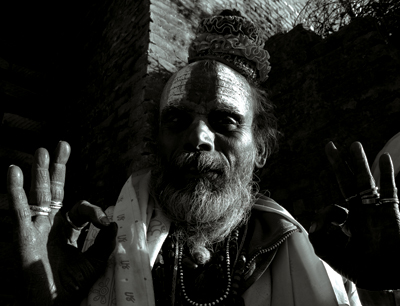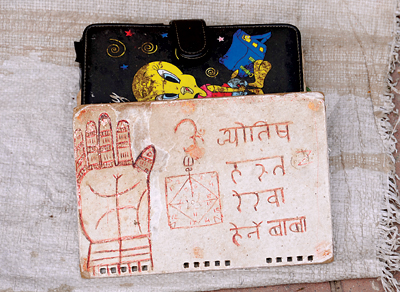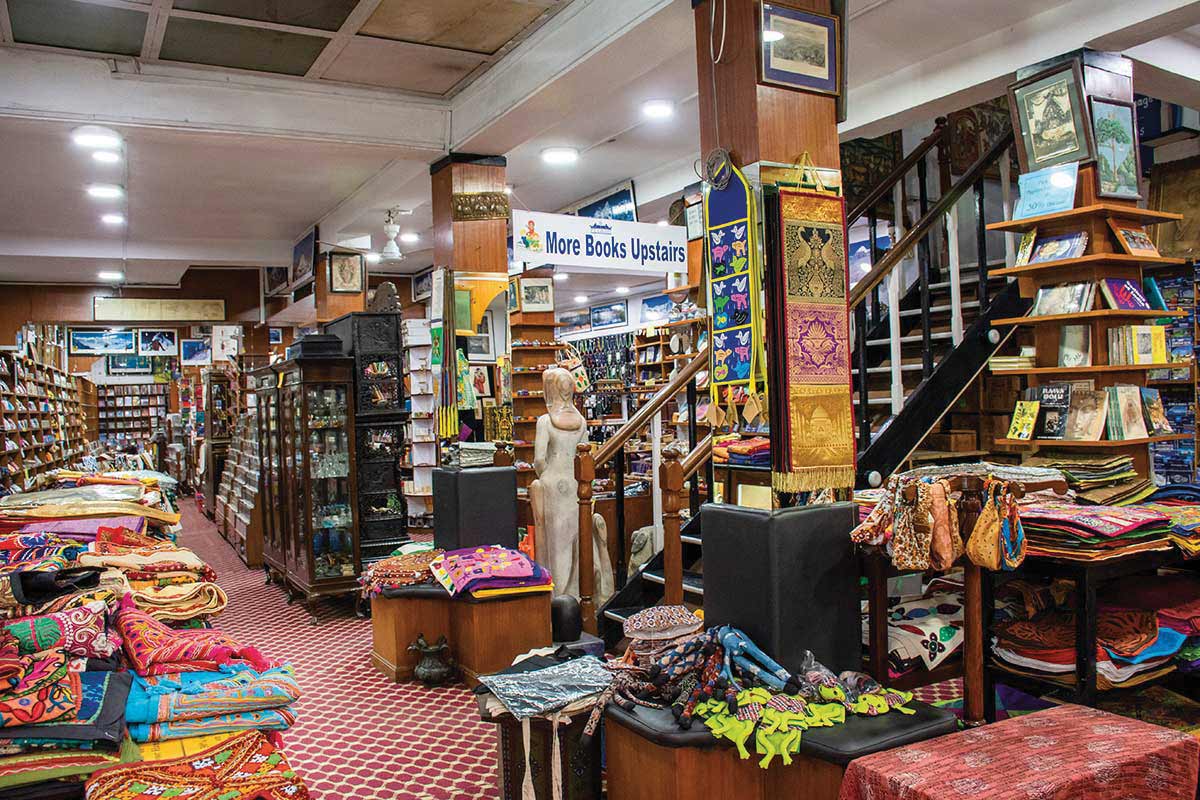Have you ever been duped by Babas? As you walk in the streets and along the main-roads of Kathmandu, you see half clad, almost unclad and sometimes quite ‘differently clad’ Babas. They have gruff, loud and disdainful voices, capable of frightening the wits out of you. Some Babas combine these qualities with trifle sorceries and you are sure to fall in their trappings. Only I thought I never would.
Once as I was coming out of a temple after offering prayer, there, I saw a Baba. I had seen him quaff a mouthful of gutka, the addictive beetle nut, before I entered the temple. He was waiting for me to come out. The moment he saw me, he said in a stern, but nonthreatening voice, “Give alms in the name of Allah and you will have thousand reasons to rejoice.”

Babas are of a different breed
On principle, I hesitate to give alms to those physically fit enough to work or who by their very appearance suggest that the alms given will be misused. But once you have read a passage from the book, The Prophet by Khalil Gibran, withholding alms from a seeker, whether you think he deserves it or not, seems almost like a sin, particularly, when you are in a position to give.
You often say, “I would give but only to the deserving.” The trees in your orchard say not so, nor the flocks in your pasture. They give that they may live, for to withhold is to perish. Surely he who is worthy to receive his days and his nights is worthy of all else from you. And he who has deserved to drink from the ocean of life deserves to fill his cup from your little stream.
The two lines that precede these almost sound like a warning to those amongst us who are judgmental.
All you have shall some day be given; Therefore give now, that the season of giving may be yours’ and not your inheritors.’
Since I read these lines, denying alms except when not in a position to give, have left me with a guilty conscience.
I decided to give him the five rupee note I had in my pocket. I was also curiously observing the strange looking Baba. He had a very dark face with a small scar on the cheekbone just below the right eye. A flowing white dhoti full of dotted floral prints in green was tied around his waist. He had on a loosely fitted kurta fashioned out of the same cloth. He was wearing headgear which, coupled with his beard and moustache, gave him the look of an Afghan tribal. He wore necklaces of multicolored stones, among which was one with a pendant with an image of the Sai Baba of Shirdi. His entire belongings were stuffed in three large jholas slung from his neck and resting comfortably under his left shoulder. The bags were puffed up, filled with heavens know what. He could remind children of the devil they would have heard about in some ghost stories. Even grownups, I thought, would approach him with caution. Now that I was very close, I too was on guard.
I gave him the five rupee note and smiled. His teeth didn’t have a trace of whiteness in them. They were crumbling and seemed like the ramparts of a dilapidated old fort.
He placed the five rupee note on the palm of his one hand and folded it with the other in the same manner a person crushing tobacco before chewing. He turned the hand in which he had the money into a fist and placed it against his forehead. Then, closing his eyes, he blabbered in a slow, unintelligible gurgle.
“Some sort of incantation,” I thought.
A few seconds later, he flung his fist towards me and opened it. And guess what? Instead of the five rupee note, there was a talisman! I was already half expecting some trick of the sort. Still I was taken by surprise. We all know how dazed and stupid we feel when magic, however trifle, is performed in front of our vigilant eyes.
Noticing the awe I must have betrayed, the Baba spoke with an imposing voice. “Wear it on Tuesday on your right arm and all your wishes will be fulfilled. Have faith in Baba and give with an open heart.” His homily simply meant that mere five rupees wasn’t enough.
“Is it some kind of black magic?” I asked him with a frown, trying not to be impressed easily. “It is a blessing from Azmer Sharif,” he said. I know that Azmer Sharif is a very popular shrine located in the city of Azmer in Rajasthan in India.
I kept the Talisman, unsure whether I would wear or just throw it away. A more pressing concern was whether I should or should not give with an ‘open heart.’ Against all my better judgments, I decided to give him 50 rupees. “That’s all,” I thought. “If he insists for more, I’ll throw the talisman right in his face and drive him away.”
When I gave him the money, he simply smirked and refused to accept the money. Instead, he bent down, picked up a few grains of sand in his hand and placed it before me. “What do you see brother?” he asked me. “Sand,” I said, bracing to foil his trick and cautious not to be deceived once again.
Then he placed the hand on his forehead and made some slow unintelligible gurgle, like before, then opened his hand with a sudden thrust and lo! Instead of a talisman, there was a golden color statuette of, of all things, Lord Ganesh.

The “oh-my-gawd” expression must have hung on my face for a long while as the Baba, taking pity on my perplexity, now prophesized in an endearing tone, “A happy soul you are, content with what you have. With the blessings of Dargah Shariff all your remaining wishes will be fulfilled by 26th of the next month. My words will not go wasted. Don’t doubt. Whatever you offer will be offered at Dargah. Give enough so that I can offer a chadar (shawl) at the Dargah of Azmer Shariff.”
A chadar?! Why, that’s like asking 300 rupees!
I was prepared for a showdown, but the Ganesh pull-off easily thawed the hostility brewing inside me. I was, however, determined not to give him more than fifty rupees. I simply told him that I was a student and hadn’t started earning yet. Until that moment he was brimming at having found the catch of the day. Now he seemed desperate to wrap up the show.
“Make it two brother, at least make it two,” he told me implying that I should add another fifty, making the total hundred. As I kept on repeating my helplessness he accepted the fifty rupee note and said, “I hope you are giving with a happy heart.” For a second, I thought he wouldn’t take the money if I told him how pathetically I regretted giving it. But before I could say anything, he had slipped the money into his pocket turned around and left with a brisk pace.
“That’s the highest anybody gave,” said one of the two young lads whom I didn’t mention earlier, but were apprehensively following the Baba observing his tricks incredulously. “Others gave only 10 or 20 rupees,” said his friend, protesting my irrational generosity. “Did you notice him place the talisman before folding the five rupee note, we did,” said the first one. “But what did he show you the second time?” he was quick to ask. “A golden statue of Ganesh,” I told him. Their jaws fell-off a bit as they gasped in surprise. “He didn’t show that to anybody before,” said the kids sullenly. Evidently they were miffed at the Baba for depriving them of the grand trick. The boys left the scene shaking their heads and prattling on as they went.
Later when I told my dad the whole story, he was furious. He cautioned me never to give a penny to such fraudsters in future. But my dad hardly realizes that the phony Baba gave me an interesting story worth much more than the fifty bucks I gave him in alms. Or was it fifty-five?










